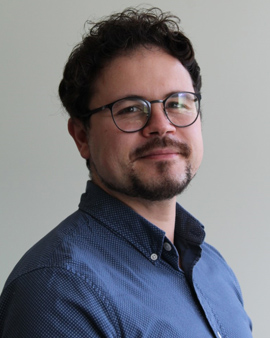
How long have you been at Drexel?
I started my lab and my current position on January 1, 2022.
Where were you before joining Drexel?
I was a postdoc at MD Anderson Cancer Center for 6 years; I got there after defending my PhD at the University of Milano-Bicocca, in Italy, my home country.
Can you tell me about the research that you're doing?
In my lab, we study drug resistance, i.e., why and how certain cancer patients do not respond to drugs or they stop responding after an initial successful round of therapy.
How did you become interested in that research?
Since my grad studies, I have been intrigued by the study of novel treatment approaches for patients who currently have limited viable options. Then during my postdoc in Dr. Kwong’s lab, I focused particularly on melanoma, a deadly type of skin cancer. Melanoma is not only a relevant health issue (more than 200,000 cases per year) but a great model pathology for which many pioneeristic approaches have been developed, the most famous probably being the so-called “immunotherapy.” Consistently, in my lab, I am now using many strategies I developed in melanoma systems for other cancer types and settings.
How are you conducting this research?
All the research starts from a clinical problem: We detect categories of patients at a higher risk of drug resistance, for example, because they have a specific genetic mutation. Then we try to model that particular class of patients in multiple models: We use human cells grown in dishes, human cells implanted in mice, and/or mice developing spontaneous tumors. We analyze the response to drugs in the various systems, and with bioinformatics tools, we try to detect potential vulnerabilities. Our research aims to be translational, meaning that we don’t want just to understand why a patient does not respond to treatment, but also we strive to find new candidate approaches to improve patient prognosis. Our final research product is always a drug, a combination of drugs or a new method of delivery that we believe can improve treatment outcomes.
What drew you to biomedical research?
It is all a worm’s fault! During high school I got involved in a summer experience where students were introduced to lab research. I was assigned to a group that was studying cancer using…worms. These little nematodes (C. elegans) are a fantastic model system because they are easy to manipulate and mirror many mechanisms occurring in humans. The possibility of using a simplified model to study complex phenomena immediately got my interest and attention. After this experience, I pursued my undergrad and grad studies focusing on developing and studying models of human pathology (mainly mouse models) to identify novel treatment approaches.
Did you always see yourself wanting to work in academia?
Yes, this was something I knew since I first stepped into a research lab. Not only do I enjoy the scientific research process, but I genuinely love the educational aspect of it. I love cultivating talents and contributing to the development of the scientists and health professionals of the future.
What advice would you give to students who want to follow a similar path?
First of all, if you know this is your path, just go for it. Pretty much everybody is going to tell you that it is tough and you only have a small percentage of success. I just believe you have to find the job that fits your talents and to do so you have to cultivate and leverage your strengths. Second, find mentors who are invested in your growth and in your success, who genuinely care about you, and who are willing to go out on a limb for you. Third, work hard but smart. Grad school and then a postdoc are long years. Lots of things will not work, but that’s why it is called research. Leave work at work, and take some space for your self-care. Fourth, network, network, network. Meet people, present your data and discuss your project. This is how I got my present job, how I started many collaborations and some mentorship relationships began. Last but definitely not least, have fun! Take your job professionally and seriously, but have some genuine good time asking the questions you really want to ask and doing the research you want to do.
What qualities do you look for in students who are coming into your lab?
Enthusiasm, curiosity and troubleshooting. Every single student I have interacted with here at Drexel exceeded my expectations in all these characteristics. Biology is not a black and white science, and things do not work as expected 95% of the time. For this reason, the students I am looking for are the ones who are not defeated after many failed attempts, who want to try and understand why a particular hypothesis is not working, and proactively search for a new solution.
In terms of being part of the Drexel community, do you have any favorite memories from your time here so far?
I was just incredibly overwhelmed by the collaborative attitude of my department, Pharmacology and Physiology. I only knew one person in the department before joining, but after a few months, I have already written a dozen research projects in collaboration with so many of my new colleagues. The administrative staff is just superb, and the chair, Dr. Meucci is an incredible mentor. The amount of help and support I received was the best surprise I could have ever received as a new member of this community.
What do you do when you're not in the classroom or lab?
I particularly enjoy nature: I love hiking with my dog and scuba diving!